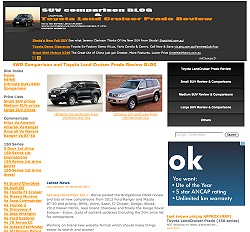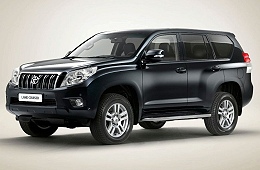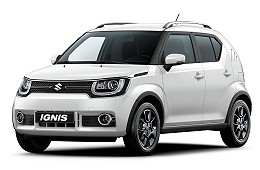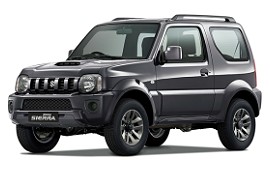|
|
VS |
|
Welcome to the all new Suzuki Ignis vs Suzuki Jimny comparison for 2017. We are excited by the launch of the new Suzuki Ignis a spiritual replacement for the original Ignis concept or original Holden Cruze. You still see them on the road because ether are inherently reliable and the only mini-SUV style city cars. The Suzuki Jimny is still made, essentially unchanged for nearly 20 years, a testament to the original design. Sure you can only be one of the 100 customers a year that can buy a Jimny but it’s the smallest and unique genuine 4WD you can buy. That said both are the only micro SUVs on sale in 2017.
Suzuki Ignis vs Suzuki Jimny exterior comparison: The Suzuki Jimny is a classic design, it still looks good and modern even cool little car/suv/4Wd regardless of category. The Jimny is old enough to be called retro and can’t be compared as . The Ignis styling is a modern interpretation of an old Suzuki Cervo or Fronte and the modern retro inspired design looks good. The design is a genuine cross between a small hatchback and am off roader.
Suzuki Ignis Vs Suzuki Jimny interior comparison: The Jimny design is 20 years old and it does show but at the same time is stood the test of time. It is small in there but acceptable by 2017 standards and but most of all fits its purpose. Being a genuine off roader the Jimny has a easy to clean hard plastic interior that is solid to touch although commercial grade by 2017 standards. The Ignis is larger on the inside and looks modern too, while not a luxury car interior it’s designed for its target market of younger folks living in the city or nearby suburbs. It has all the essentials including nice seats and contrasting coloured plastics that are even harder than the Jimny but in a good way.
Suzuki Ignis Vs Suzuki Jimny engines and technology comparison: The Jimny is a genuine 4WD that can go off road and built to withstand tough conditions. It’s construction based on a frame, with two gearboxes are all it needs to conquer all sorts of terrain but it capability needs to be matched with an experienced driver, sadly a skill that is being lost. Apart form that it’s got a VVT engine so there power all the way to the red line. The Ignis a essentially a raised front wheel drive hatchback like any other modern SUV but there is a hybrid option, all the latest safety tech and in-car entertainment and comms including DAB dado and connectivity to all the mobile phones you can think of. Some complain that it can’t park its self we say you don’t need a self parking system on a car this size unless your driving skills are that bad.
Regardless of all the tech specs the question you will always ask is how fast will the Jimny or the Ignis be will such small engines. The answer is due to being so light power is will be zippy and fast enough but the traditional tight Suzuki engines will fool you for the first 40,000 kms (as with every Suzuki we’ve owned). No forgetting it is a city car
Suzuki Ignis Vs Suzuki Jimny comparison: Driven the Jimny many times of the years. It drives well for such an old design zippy to 60 but it will take plenty of revs and noise for fast moving traffic. As we always say get the auto and rev it to enjoy the drive.
The winner of the Suzuki Ignis Vs Suzuki Jimny comparison is a draw. Both are great city cars or SUVs. The Jimny is the cheapest small 4WD you can by and it’s the only choice if going off road is a consideration. It also works really well in the city thanks to the raise height and genuine toughness. The Jimny is lightweight, inbuilt toughness and reliability and small size make it perfect for inner city travels or off road adventures. The all new Ignis has all the makings of a perfect city high riding car and arguably an SUV. The interior is more useful than the Jimny more economical and modern but it could never be as tough the Jimny.
| Suzuki Ignis | Suzuki Jimny |
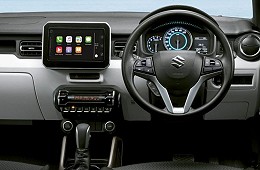 |
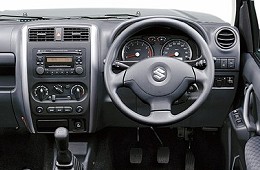 |
| Engines | |
| IL 4 Cylinder SOHC EFI VVT 1.2 Litre (1242cc) Claimed 66Kw @ 6000RPM Claimed 120Nm @ 4400RPM |
IL 4 Cylinder (M13A) DOHC EFI VVT 1.3 Litre (1328cc) Claimed 62.5Kw @ 6000RPM Claimed 110Nm @ 4100RPM |
| Weight | |
| Kerb weight FROM 820 Kg Towing capacity up to N/A kg |
Kerb weight 1060 – 1075Kg Towing capacity up to 1300kg |
| Fuel capacity & consumption | |
| Up to 32 litres IL4 Petrol 4.9 Lts per 100km AVG |
Up to 40 litres IL4 Petrol 7.1 Lts per 100km AVG (Manual) IL4 Petrol 7.4 Lts per 100km AVG (Auto) |
| Other specifications | |
| 5 speed manual or CVT Auto Overall height/width 1595/1660 Overall length/wheelbase 3700/2435 4WD system: FWD or AWD on demand ANCAP Safety: 5/5 Tyre size: 175-65-15 |
5 speed manual or 4 speed Auto Overall height/width 1705/1600 Overall length/wheelbase 3675/2250 4WD system: Selectable 4WD ANCAP Safety: 4/5 Tyre size: 205-70-15 |
| Capability | |
| Angle of: (degrees) Approach xx Departure xx Breakover xx Ground clearance (unloaded) 180 mm Water Fording depth xxmm Max |
Angle of: (degrees) Approach 42 Departure 46 Breakover xx Ground clearance (unloaded) 190mm Water Fording depth xxmm Max |
| Performance | |
| Pricing | |
| 2017 $15,990 – 18,900 AUD | 2017 $20,990 – 22,990 AUD *Always check with the dealer for up to date pricing, specifications, on-road costs, accessories and specials etc.. everything as usual is subject to change! |

